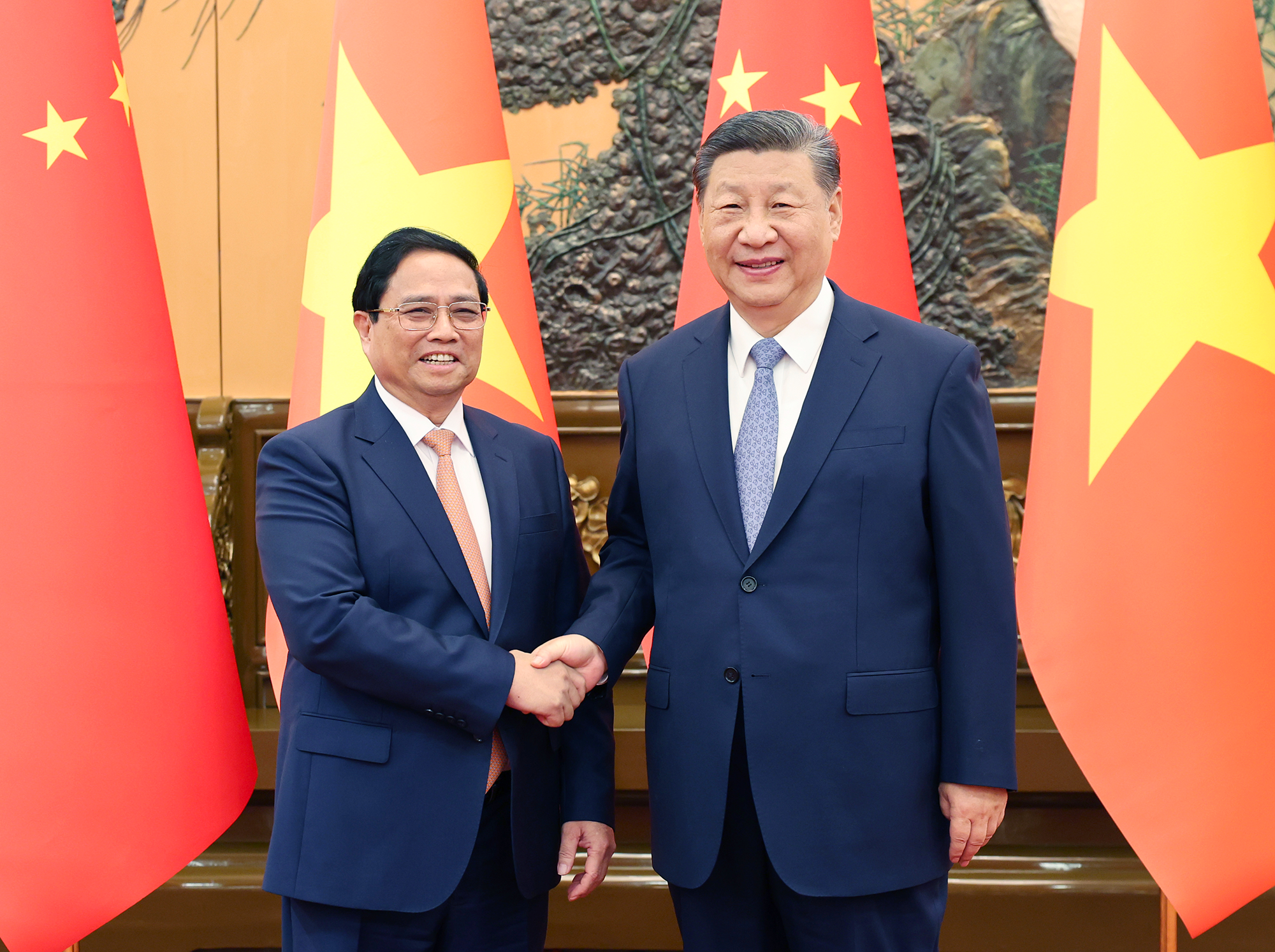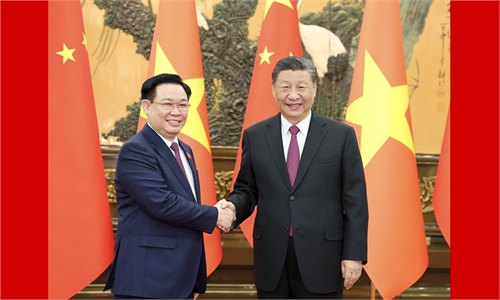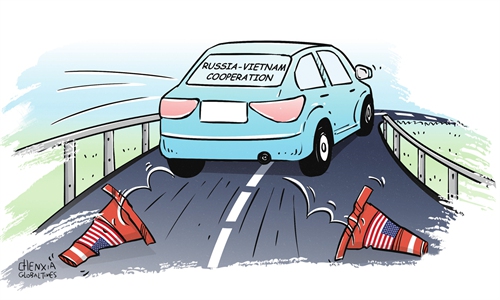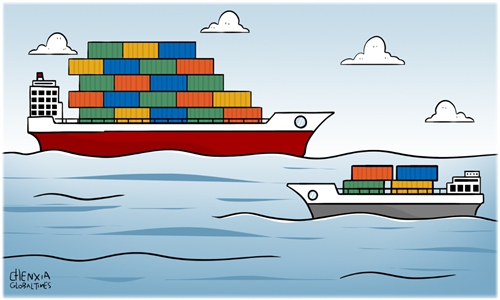
Chinese President Xi Jinping shakes hands with visiting Prime Minister of Vietnam Pham Minh Chinh on June 26, 2024 in Beijing. Chinh is in China to attend the 2024 Summer Davos. Photo: Xinhua
Chinese President Xi Jinping met with Prime Minister of Vietnam Pham Minh Chinh in Beijing on Wednesday, saying that the rapid economic development and long-term social stability of the two countries demonstrate the strengths of the socialist system.
Xi asked Chinh to convey his cordial greetings to Nguyen Phu Trong, general secretary of the Communist Party of Vietnam Central Committee, and to Vietnamese President To Lam.
Xi said that during his visit to Vietnam at the end of last year, he and Trong announced the building of a China-Vietnam community with a shared future that carries strategic significance, ushering bilateral relations into a new stage.
Over the past half a year, the two parties and the two countries have enjoyed close exchanges among high-ranking officials and smooth cooperation in various fields, bringing tangible benefits to the two peoples, he said.
Noting that the world today is going through changes unseen in a century, Xi said both China and Vietnam have maintained rapid economic development and long-term social stability, demonstrating the strengths of the socialist system.
He said the building of a China-Vietnam community with a shared future that carries strategic significance is in line with the modernization needs of the two countries, and is conducive to maintaining regional peace and stability and to promoting the development of the global socialist cause.
China is willing to work with Vietnam to maintain solidarity and friendship, consolidate mutual support, and deepen mutually beneficial cooperation, Xi said, adding that China also stands ready to join hands with Vietnam to march toward modernization and make greater contributions to world peace, stability, development and prosperity.
China is willing to encourage more Chinese enterprises to increase investment in Vietnam, and hopes that Vietnam will provide a fair, just and non-discriminatory business environment for Chinese enterprises, Xi said.
Both sides should make good use of the resources of friendly exchanges between the two parties, support border provinces to strengthen exchanges, implement livelihood programs such as agriculture, education and healthcare, make good use of nongovernmental, youth and other exchange platforms, and consolidate the public opinion foundation of China-Vietnam friendship, Xi said.
Xi noted both sides should properly handle maritime issues, accelerate the joint development of maritime resources, and jointly maintain regional peace and stability.
Chinh said that Vietnam supports China's position on the Taiwan question and firmly adheres to the one-China principle. Deepening strategic mutual trust and pragmatic cooperation with China and building a community with a shared future that carries strategic significance constitute Vietnam's top priority and strategic choice in its foreign policy, and Vietnam will not be swayed by external instigation or disruptions, Chinh said.
Concretizing cooperation
Xu Liping, director of the Center for Southeast Asian Studies at the Chinese Academy of Social Sciences, told the Global Times on Wednesday that high-level visits between China and Vietnam have been frequent in recent years, serving as a cornerstone, guiding the direction of bilateral ties. These high-level visits have further solidified the foundation for enhancing strategic mutual trust between China and Vietnam.
China has been Vietnam's largest trading partner for many years, and strengthening economic relations with China is crucial for boosting Vietnam's own development, Gu Xiaosong, dean of the ASEAN Research Institute of Hainan Tropical Ocean University, told the Global Times on Wednesday.
On Monday, Chinese Premier Li Qiang met with Chinh in Northeast China's Dalian on sidelines of the Summer Davos.
The Vietnamese prime minister proposed that the two sides accelerate the progress of market opening for other agricultural and aquatic products; create conditions for the early establishment of the Vietnam trade promotion offices in multiple Chinese cities; and exchange measures to improve customs clearance efficiency, upgrade border gate infrastructure and promote the construction of smart border gates, Voice of Vietnam reported.
Vietnam expects to cooperate with China in personnel training, management, control, and design of railway projects, per media reports.
Gu believes Chinh's visit will further enhance partnership between the two close neighbors, especially in infrastructure development such as railways and highways. Additionally, enhancing cooperation between the two countries is vital for stabilizing regional industrial and supply chains, Gu noted.
Ge Hongliang, vice dean of the ASEAN College at the Guangxi Minzu University, told the Global Times on Wednesday that emerging industries, including new energy, have great potential to increase bilateral cooperation.
The two countries also share consensus on many regional and international issues and global governance, Ge said, citing frequent mutual visits of leaders of the two countries and the two parties.
Bamboo diplomacy
The Wednesday meeting came amid Vietnam's intensive interactions with other major powers.
Russian President Vladimir Putin made a visit to Vietnam on June 20, the first since 2017, against the backdrop of anxious criticism from the US.
Hot on the heels of Putin's visit, Daniel Kritenbrink, the US State Department's second-in-command of East Asian and Pacific Affairs, touched down in Hanoi on June 21 for a two-day visit.
Kritenbrink told media in Hanoi the trust between the US and Vietnam was at an "all-time high," while still pointing the finger at Hanoi's relationship with Moscow. Vietnam elevated its relations with the US late in 2023 to a comprehensive strategic partnership.
Analysts said that Vietnam has been pursuing "bamboo diplomacy" - swaying with the winds, avoiding taking sides in international disputes and striking a delicate balance in major power competitions.
While the US considers Vietnam a key partner to implement its Indo-Pacific Strategy and has been working hard to court the Southeast Asian country, Xu believes that the scope of their cooperation is limited due to a number of structural contradictions, including differences in social systems, ideologies and historical conflicts.
"Vietnam has managed to maintain a neutral and objective stance," Xu said.
Vietnam has also actively participated in ASEAN affairs and adopted a different approach from the Philippines in handling disputes with China over the South China Sea, observers noted.
"Hanoi is well aware that peace and stability are the biggest common interest of the region, and provocations or confrontations with China will bring no good," Xu said.
Gu said that amid escalating tensions in the South China Sea due to certain country's provocations under influence of external forces, it is important for China and Vietnam, as well as other Southeast Asian countries, to enhance communication and manage the sensitive situation through collaborative efforts.
Ge underlined that developing China ties constitutes a vital part of Vietnam's pursuit of bamboo diplomacy. By cooperating with China, Vietnam eyes economic growth, integration into the region and a bigger say in maintaining a stable and favorable international environment.



